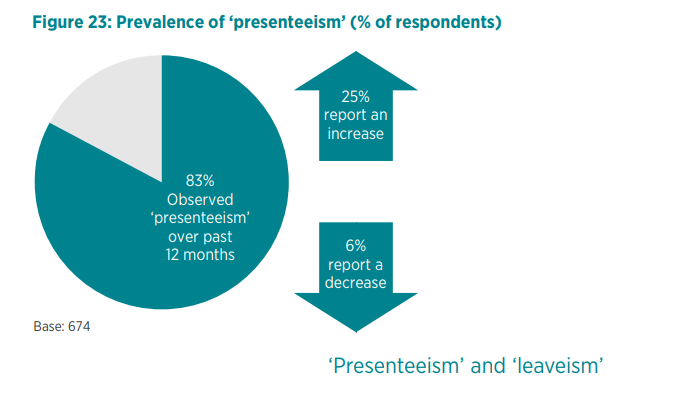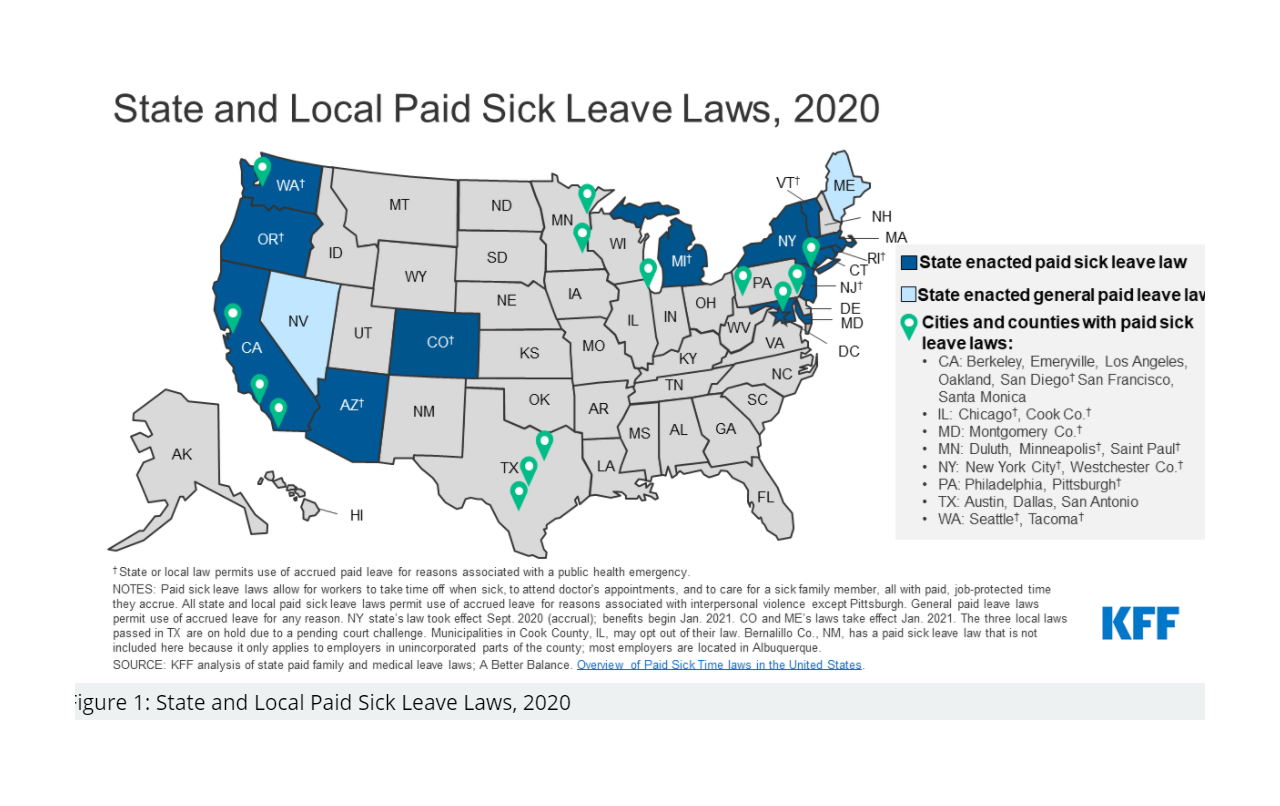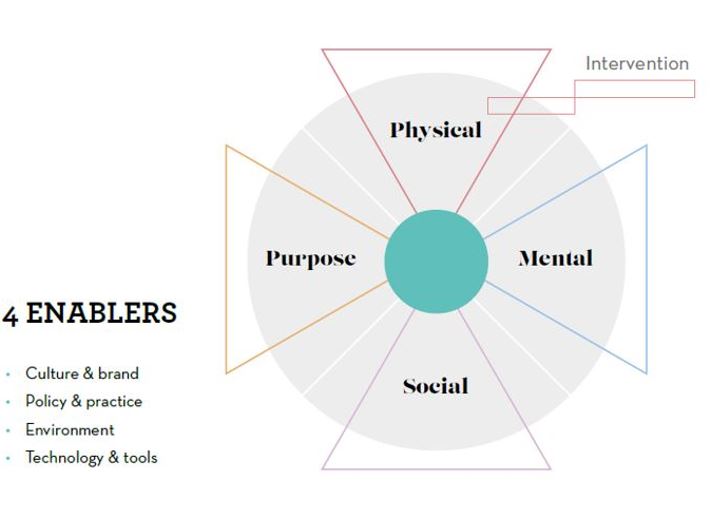Sound familiar? A growing number of workers are ignoring their physical symptoms and pushing through sick days without announcing it. Even during the pandemic, many countries reported some of the lowest numbers of workers taking sick days in years.
Working when you’re physically, mentally or emotionally unwell is called presenteeism – and, unfortunately, it's becoming more common.
Why do people feel compelled to work, even when they don’t feel well?br>
Some employees, like teachers or nurses, know that being absent will likely create more work for their colleagues. Others feel like they cannot take a sick day, because their managers request their (virtual) presence. On the other hand, some workers who might be facing a restructuring or who might be working on a fixed-term contract, do not feel as if they can afford to take a sick day when their boss might see attendance as a sign of commitment.
The Impact of Working While Sick
Since the start of the pandemic, workers across the globe have reported coming into work while under the weather. Presenteeism can have a big impact on productivity and output, though.
In the U.K., as many as 83% of employees said they witnessed “presenteeism,” or working while sick, in their workplace in the past 12 months, according to a survey of health and wellbeing at work by the UK’s Chartered Institute of Personnel and Development. In comparison, that share of workers was reported at 24% in 2010, just after the global financial crisis.
At the same time, data shows that the number of U.K. employees taking sick leave has reached an all-time low. Workers are taking just 5.9 days per person per year amid the pandemic. A separate ONS survey found that the share of people taking sick days in the UK dropped to the lowest since 1995 as people were forced to work from home.

And unsurprisingly, it seems to be a global Covid-19-related trend. On the other side of the world, data from the Australian Bureau of Statistics (ABS) found that fewer, not more, Australians are actually calling in sick during the pandemic. The ABS measures the broader number of Australian workers staying home due to sickness, illness, or injury.
Data shows that working while sick, though, can have a significant economic and productivity cost for the company.
Ron Goetzel, director of the Institute for Health and Productivity Studies at the Johns Hopkins Bloomberg School of Public Health, estimates that workers who show up to work while sick potentially double the cost for an employer versus those staying at home. Even common illnesses like migraines, Goetzel told Bloomberg, lead to more than $45 billion in losses each year in the U.S. and Europe. A large part of these losses can be directly tied to presenteeism.
Presenteeism costs U.S. companies billions of dollars a year in lost productivity - $226 billion, to be exact, according to a report in WEF. In Japan, the same report found, working while sick cost companies around $3,000 per employee, twice the cost of absenteeism. That cost is around $800 in the U.K.
Why Employees Should Call In Sick
Cultural challenges, workplace norms, pressures, operational demands, fear of unemployment, and fear of missing out on job opportunities for career advancement are just a few of the reasons that workers opt to stay online, even when they feel unwell. These factors have only been exacerbated by the shift to work-from-home and the structural hurdles of paid sick leave.
Here are just a few reasons why the failure to call in sick will impact your productivity, and your team:
-
Less Productive: When sick, employees will be less productive and are likely to spend twice as much time to get the same amount of work done.
-
Declining Work Quality: Working while sick has a negative impact on your brain function.
-
Negative Environment: Logging in when you don’t feel well can have a negative impact on a workplace and its dynamics. Team members may misread your communications.
-
You Need a Break: Sometimes, employees just need a break. Stepping away can help you return feeling refreshed and energized.
-
Presenteeism: working while unwell can create a lasting culture of presenteeism.
Handling Sick Days In A Post-Pandemic World
As the world slowly begins a shift towards a post-pandemic reality, the concept of a sick day – and how managers approach it – may have to change. Here are some of the ways leaders can approach sick days:
- Pay for sick days: When companies offer paid sick days, they can ensure that employees feel reassured. In the U.S., for example, paid sick leave legislation differs dramatically depending on your home state, according to a KFF report.

-
Expand the concept of a sick day: Employees may feel less guilt taking a sick day when the definition includes mental health days, time to care for a sick family member, or other broader stipulations.
-
Create the right work culture and environment: Implement a top-down approach and have managers lead by example. Leaders can check in on employees to create an enabling environment. For example, if someone isn’t talking over the course of several meetings, a manager might plan to speak with them on the side to check if that employee is okay. Clear, persistent, and transparent communication on the wellbeing imperative and importance of time off makes a difference.
-
Set boundaries: Individuals can work to set better boundaries when it comes to their sick days. People might fear losing their jobs if they don’t show up – and managers and HR need to do better to approach this issue.
- Expand wellbeing programs: Consider developing holistic wellness programs aimed at raising the level of physical, mental and emotional health in the first place. For example, encourage employees to exercise and adopt habits shown to improve overall wellbeing and incentivize healthy habits. The new approach to employee wellbeing, developed by the Adecco Group Foundation, unites both the top-down management and bottom-up feedback. Furthermore, the Workforce vitality model is clear and simple in that it hinges on a set of four elements of wellbeing: Physical, mental, social, and purpose.




